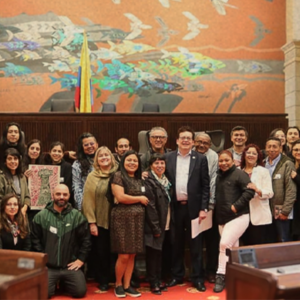On 5-7 June in Bogotá, capital city of Colombia, several activities took place linked to the struggle for human rights, environmental justice and against the impunity of transnational corporations.
Among them was a screening of the documentary The Illusion of Abundance [1] on June 5th. The film tells the stories of three women, beacons of the resistance and struggle against transnational corporations in their territories: Máxima in Peru and her resistance against Yanacocha, the second largest gold mine in the world; Berta in Honduras and her struggle against the building of the Agua Zarca hydroelectric dam; Carolina in Brazil and her tireless search for justice for the 272 people killed by the collapse of the Vale dam.
On the same day, people paid homage to Samuel Arregocés [2] and Jakeline Romero Epiayu [3], recently deceased defenders of La Guajira.
FROM THE INTERNATIONAL TO THE LOCAL LEVEL
On June 6th, local organisations, defenders of rivers and nature, legal advice collectives and Indigenous Peoples from different regions of Colombia came together in a National Meeting with the intention – and conviction – to build a National Campaign against transnational corporate impunity. This is not a new process in the country; it has been in progress and draws from the international process of the UN Binding Treaty [4] on transnational corporations and human rights.
This year marks the 10th anniversary of Resolution 26/9 [5], which created the open-ended group and opened negotiations at the UN for a legally binding and international tool to protect the rights of peoples and hold transnational corporations accountable for human rights violations. An event was also held in Bogotá to commemorate and celebrate a decade of struggle and joint work.
Peoples’ rights in Colombia have been experiencing such violations for more than a century. At the beginning of the event, Danilo Urrea from Friends of the Earth Latin America and the Caribbean [6], stated: ‘already in the 1920s, when Colombia began its insertion in international capitalism, two companies appeared: the United Fruit Company and the Tropical Oil Company. We can trace violations of workers’ rights since then. If we remember the massacre at banana plantations in 1928, it was directly linked to transnational corporations.’
The United Fruit Company, to which Urrea made reference, is now Chiquita Brands, a transnational corporation that was ordered on June 10th to pay millions of dollars in fines for supporting paramilitary groups with weapons and infrastructure from 1997 to 2004.
Jenny Ortiz, from the Centro de Investigación y Educación Popular (CINEP) [7], Peace Program, presented three lines of joint work. The first is to continue building the capacities of movements and organisations, the second is to start building binding (obligatory) initiatives with the creation of a National Committee for the Promotion of the National Campaign, and the third and last is to raise awareness among the public and society in general, so that this is not a technical or regional issue, but a grassroots and national one.
After Urrea and Ortiz’s opening remarks, there was a panel on business regulation made up of Iván González from the Trade Union Confederation of the Americas [8], Pablo Fajardo from the Union of People Affected by Chevron, ex-Texaco (UDAPT) – Friends of the Earth Ecuador [9], and Viviana Tacha from the Centro Socio jurídico para la defensa territorial – SIEMBRA [10].
González reaffirmed that the struggle is historical because ‘corporations are part of a project of domination, they are the expression of colonial power at different times.’ He also made reference to the different mechanisms and instruments that have been developed since the 1970s and analysed why voluntary mechanisms are not enough, but on the contrary are part of the architecture of impunity.
Pablo Fajardo, from UDAPT-Friends of the Earth Ecuador, spoke about the Chevron Corporation case in the Northern Ecuadorian Amazon [11]. ‘The damage caused by Chevron was intentional, it is not part of a collapse or an accident’ confirmed Fajardo, which is why the oil corporation was ordered by a court to pay millions in reparation, which so far have not been paid.
In Fajardo’s words, Chevron planned and carried out ‘a plan to attack the foundations of the Ecuadorian State and thus undermine the credibility of national court orders, and render them void.’ This includes lobbying international institutions to prevent Ecuador from obtaining loans, linking governments to criminal groups, and filing international investment arbitrations to undermine the State.
Meanwhile, Viviana Tacha presented a set of reflections that emerged in the process of national joint work. The Binding Treaty is a ‘political and regulatory horizon,’ she said, because of its binding nature. The question is how to adapt this international instrument and bring it to the national level, for which she made reference to a publication written by SIEMBRA: Human rights first, 5 elements for an effective binding treaty for Colombia [12]. The key contents of the draft law are the binding nature of the treaty, placing communities and those affected at the centre, and the transnational nature of corporations.
FROM THE BOTTOM UP
The last event was a public hearing that took place on June 7th at the Colombian Congress titled: ‘Regulatory frameworks for transnational corporations on Human Rights: From the UN Binding Treaty to a national law on businesses and Human Rights.’ The hearing was convened by parliamentarian Alirio Uribe, together with Uruguayan MP Lilian Galán. Both of them are members of the Global Inter-Parliamentary Network for a Binding Treaty, known as GIN.
At the start of the hearing, Uribe made reference to the case of Chiquita Brands International as a clear example of the violation of human rights by transnational corporations.
After their presentation, all the participants shared for the first time the ‘Statement of the National Campaign to stop a century of impunity,’ which had been collectively developed in the previous days, followed by the participation of social movements and institutional representatives.
